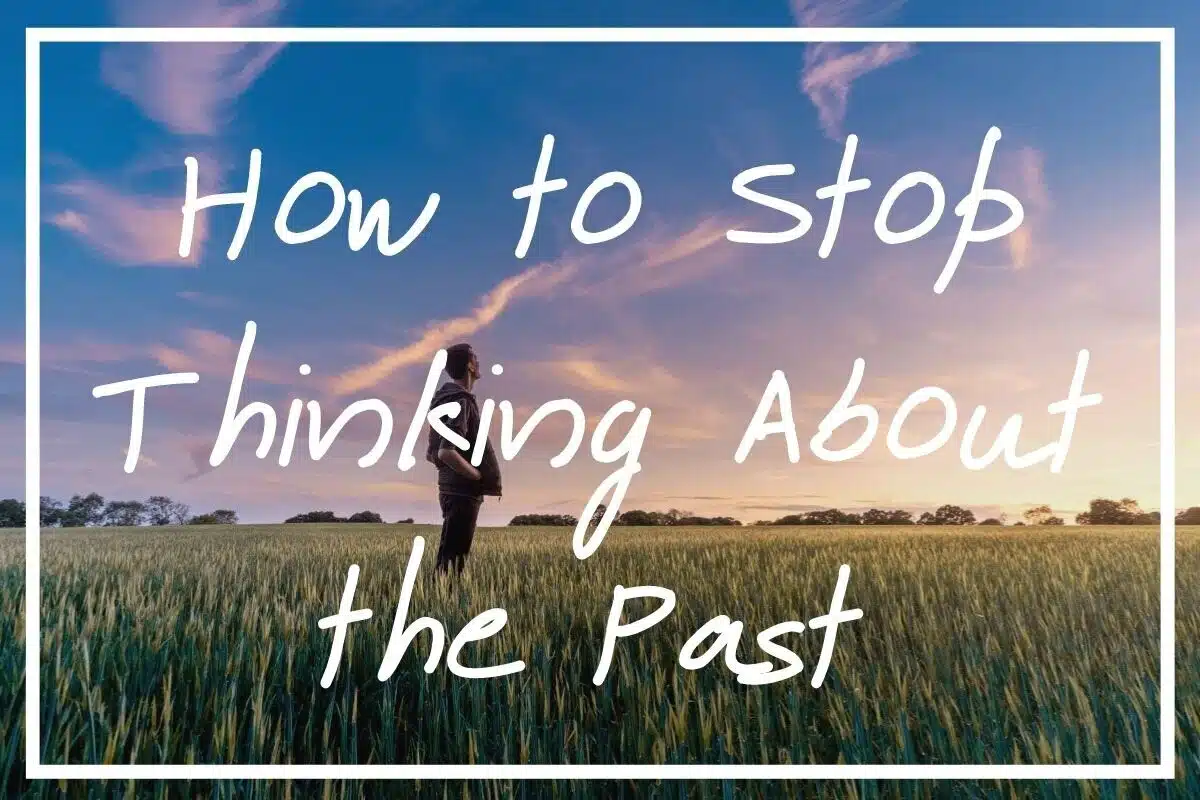
Wondering how to stop thinking about the past? I hope this post helps!
Trying to stop thinking about the past so much?
I don’t blame you!
I know from regular personal experience just how tiring, distracting, and, downright unhelpful ruminating over past events can be.
Thankfully, there are many things you and I can both do to overcome the issue.
Sound good?
Check out this comprehensive guide on how to stop thinking about past mistakes, negative situations, and so on.
I hope it helps!
Why Are We Always Thinking About the Past?
Thinking about the past too much might be annoying, exhausting, and something you’d like to stop doing.
…But it’s also 100% natural.
So, first thing’s first, don’t beat yourself up about it!
Literally everyone thinks about their history. It’s just a matter of degrees.
More to the point, unless we have some sort of brain damage or neurological impairment, we can’t not think about the past.
It’s part of our hardware; pre-programming based upon millions of years of evolution.
Presumably, thinking about past experiences would have helped our ancient ancestors look for food/water, avoid dangerous areas, and, ultimately, not die.
Instead of trying to stop thinking about the past altogether, then, a more realistic goal might be to:
Start thinking less and/or gain greater control over our minds.
In other words, we want to learn how to turn it on and off; to get a break when the thoughts rattling away inside our heads become a little too noisy.
Here we go then: how to stop thinking about past mistakes, events, and basically anything else that isn’t in the here-and-now!
Related posts you might like:
- 110 Awesome I Don’t Care Quotes!
- 100 Crazy Bucket List Ideas
- Awesome Attitude Captions and Quotes
- 9 Epic Goal Setting Games
- 9 Ways to Escape the Rat Race
- 25 Reasons Personal Development Is Important
- 10 Tips to Figure Your Life Out
- What to Do When You Hate Your Life
How to Stop Thinking About the Past Too Much: 10 Tips
Full disclosure: I’m definitely no expert at switching off the monkey mind!
However, after years of trying, I’ve come across a reasonable number of strategies that can to make a difference.
With that in mind, here are 10 ways to stop thinking about the past:
1. Seek Professional Support
Ruminating excessively over something happens for a reason.
And a psychotherapist, counsellor, or psychologist can help you uncover what it is!
They’ll listen to you, ask questions, give feedback, offer reflections, and issue challenges. Some professionals will even give you homework.
In the process, you’ll start piecing together what’s been bothering you (among other realizations about yourself, your past, and how you relate to the world) and why it bothered you in the first place.
And that, in turn, should lead to a sense of resolution.
Now you know the cause, you can integrate what happened into your life and move on. You’ll stop thinking about the past so much and be less affected by future events/situations of a similar nature too.
2. Stop Trying
Have you ever heard about the idea of paradoxical intention?
I first came across it in Viktor Frankl’s book “Man’s Search for Meaning”.
The basic theory goes that when you want something to happen too badly, it ain’t gonna! And, vice versa, when you desperately don’t want something to happen, you can bet your bottom dollar that it’s going to.
Imagine a sweaty man who desperately wants to sweat less.
The more he tries to stay cool and dry, the more he’s going to sweat!
He’s so focused on not sweating that he gets anxious…which makes him sweat.
Had he heard about paradoxical intention, he’d take the opposite, seemingly contradictory approach. He’d say to himself something like, “I want to sweat as much as humanly possible!”
More than happy to sweat buckets, he relaxes into the day and focuses on other things. The end result?
What he wanted in the first place: less sweat.
I reckon someone could take the same approach when it comes to thinking about the past.
Rather than trying to stop, why not invite those thoughts in? Why not actively try to think as much as possible about the event/situation in question?
Thanks to paradoxical intention, the thoughts may drift away…
Almost anybody wondering how to stop thinking of the past could benefit from meditation.
3. Start Meditating
Meditation has been used for thousands of years to find stillness, quiet the monkey mind, and keep rushing thoughts at bay.
It’s now widely practiced and proven to have a positive impact on our mental health!
Although it’s no miracle cure, I highly recommend giving meditation a go if you want to calm down, unwind, and focus on the present moment.
Prepare to be frustrated at first though!
This ancient practice is a skill that takes time to hone.
I’ve experimented with meditation for years and still spend plenty of sessions immersed in thought (when my central goal is to ‘empty my mind’).
With patience and commitment, though, you definitely see improvements.
Give it a shot! Mobile apps like Headspace and Calm provide great guided meditations to help you get started.
4. Exercise More
If meditation isn’t (or doesn’t sound like) your thing, then exercise could be a useful alternative for clearing your mind.
First off, it’s obviously important for general health and wellbeing purposes.
Exercise lifts your mood, oxygenates your blood, floods your system with endorphins, and can take the edge off rumination in the process.
But it also has built-in meditative qualities.
Indeed, whether I’m running, playing tennis, working out, or hiking somewhere, my mind almost always clears of thought in the process.
I feel more present and alert. I’m focused on what I’m doing and nothing else.
…And thoughts about the past slip away as a result.
When I keep thinking about the same thing over and over, reframing the event always makes a difference.
5. Reframe the Event
The past events we think excessively about are always negative, right?
Either we did (or feel like we did) something bad, or something bad happened to us. For example, maybe we:
- Cheated on a test
- Stole something from someone
- Went through a nasty breakup
- Were treated unfairly by a teacher or colleague
- Were cheated on by our partner, and so on.
Whatever the case, we feel a sense of shame, guilt, anger, bitterness, resentment, or embarrassment…or some toxic cocktail of the lot.
This is where a strategy called reframing could come in really handy.
Simply put, it involves taking something negative and framing it as a positive.
A basic example could be talking about an issue as a challenge rather than a problem. One feels oppressive; the other, hopeful.
Tony Robbins has a similar well-known concept.
To paraphrase, he asks people something like:
“How was the worst thing that ever happened to you actually the best thing?”
Maybe being beaten up compels you to take self-defence classes that improve your self-confidence. Or maybe losing your job leads you to start a business and earn your financial freedom. And so on.
All of a sudden, these kinds of negative events take on a new light.
They feel less like a kick in the teeth and more like a stepping stone to bigger and better things.
The happy outcome? You stop thinking and worrying about them so much.
6. Seek Closure
Another way to stop thinking about the past event is to find a sense of closure.
It can feel elusive, but drawing a line under a negative experience is a powerful way to move on from it.
You put it behind you, which makes it possible to look forward (or stay present).
Now, I think there are all sorts of ways to get closure.
I also think it’s a process.
In all honesty, though, speaking to a professional therapist is probably the best way to go about it- especially if you’re seeking closure on a serious traumatic event.
That said, one method you could try is known as a “2-chair exercise” (or “chairwork”).
Commonly used in certain therapeutic circles, you take two chairs (…no surprises there) and place them opposite each other.
The chairs can represent various things.
But they’re usually used to portray different perspectives, sides of an argument, or parts of the person doing the exercise.
Whatever the case, you sit down on one chair and leave the other empty.
You then talk to the chair opposite you from one perspective and say what needs to be said, before switching chairs and addressing the initial perspective through the lens of the second.
Imagine feeling deep anger toward your dad.
You’d sit down and picture him sat opposite you.
Then you’d talk to him and let him know how you feel. You’d question him and berate him; maybe even shout at him.
Then you’d stop, sit on his chair, and imagine that you’re him, talking to you.
You’d put yourself in his shoes. You’d explain yourself from his perspective. And you’d tell yourself what you need/want to hear from him.
It might sound silly.
But, from what I gather, it can be a profound and moving therapeutic experience.
Be careful, though…
In therapy, you’d have a trained professional present at all times.
They’d be able to manage the situation, support you through difficult emotions, and ensure you finish the session feeling both safe and calm.
Do it alone and you won’t have that kind of safety net!
People who live in the past miss all the wonders of the present.
7. Take Responsibility
As humans, we have a tendency to take personal credit for good results and blame external factors for bad ones.
You see it in the student who gets a bad grade and claims it’s because the teacher doesn’t like them. Or with the footballer who claims their teammate only scored due to their epic pass. And so on…
In psychology, this phenomenon has a name: the self-serving bias.
And I think it bites us in the butt when we’re trying to stop thinking about the past!
As easy and understandable as it is to do, blaming other people or things for our personal challenges doesn’t serve us.
It’s disempowering.
I mean, if the issue’s outside us, then there’s nothing we can do about it, right?
We’re left hurting, skulking, and resenting; waiting for something to change or someone to save us.
That’s why it’s so important to take responsibility.
Jocko Willink (an ex-navy SEAL, leadership expert, speaker, podcaster, author, and general badass) talks about this in his notion of “extreme ownership”.
It’s simple: everything’s your fault…even if it isn’t.
From that starting point, you’re in total control. 100% accountable, your emotions, actions, and outcomes are no longer in someone else’s hands.
How does this help us stop thinking about the past?
Because now we’re in charge. We recognize the role we can play in finding stillness and positivity. We can take a step forward, shake ourselves out of the rut, go on a run, talk to a friend, or start meditating etcetera.
In other words, it’s a starting point for progress.
8. Write It Out
Writing my thoughts down is a key weapon in my own personal arsenal against excessive thinking.
Something about sitting down and putting pen to paper just helps clear my head.
I find clarity amongst all the confusion.
I guess writing has a meditative quality to it, where you’re so focused on translating fluid thoughts into lines and dots on a page that everything else evaporates.
Likewise, you literally take what’s inside your noggin and put it out into the world.
Maybe you’ll find it as cathartic as I do?
“Morning pages” are worth mentioning here too.
Described as windscreen wipers for the mind, the idea is to start each day by writing down anything and everything in your head.
It doesn’t have to be anything special.
It doesn’t even have to be coherent!
You simply hit the page with a stream of consciousness. No editing, proofreading, or judgment’s involved.
You get what’s inside, out.
The goal? To feel less caught up in a whirlwind of thoughts throughout the day.
Thinking too much about past mistakes? Why not find someone you trust to talk to about them?
9. Talk It Over
I’m always amazed at how helpful it is to express my feelings.
It doesn’t come naturally to me!
I’m a thinker, not a talker, so I usually retreat inward when something’s wrong.
Heck, maybe that’s why I find it so beneficial to talk things over!? Maybe I’m so accustomed to closing off that it makes a refreshing change to open up.
Whatever the case, I inevitably feel better when I do.
Interestingly, the person I’m talking to doesn’t really have to say anything either. Sure, it helps if they’re kind, patient, and understanding. Yet the magic seems to come just from sharing (as opposed to any advice or sympathy they offer).
I come away from the conversation feeling lighter and more present.
And thoughts about the past or concerns about the future disappear in the process.
10. Forgive Yourself (and/or Others)
I did something stupid a couple of years ago.
…Something that I felt (and, to an extent, still feel) extreme guilt about.
In the grand scheme of things I guess it wasn’t so bad, but it still made me sick to my stomach. And I couldn’t stop thinking about the mistake.
After days of ruminating over it, I told the person I was staying with what I just told you: that I’d done something wrong (I didn’t go into details) and felt atrocious.
I’ll never forget his advice:
“Whatever you did, life’s too short to hold onto guilt. Forgive yourself.”
And he was right.
I’d beaten myself up for long enough and it wasn’t getting me anywhere.
I couldn’t take back what I’d done, but, for whatever reason, his words took the weight off my shoulders.
I realized I had the power to forgive myself; not to feel happy about what had happened, but to learn from it and move on.
Forgiving myself didn’t happen overnight. But as the days and weeks passed, I started thinking about the past event less and less.
If you’re in a similar boat right now, then I’ll offer you the same advice that helped me back then:
Forgive yourself. Forgive yourself. Forgive yourself.
And if someone else is in the wrong?
Forgive them.
Thinking about the past too much? Think twice before trying to stop…
Thinking About the Past Isn’t Always Bad
One final thing:
Take a moment to figure out what sort of thinking you’ve been doing!
I mean, not all thoughts about the past are made equal, right?
Some are too damaging, distracting, or downright distressing to justify having around for long.
But, in other circumstances, as foul-tasting as those thoughts might be, they’re important.
They serve you somehow.
For example, I came out of a long term relationship a few years ago.
Totally heart-broken, all I could think about for weeks was my ex; the years we’d been together, the experiences we’d shared, how and why it ended, and so on.
In other words, my mind was consumed by thoughts about the past!
…And I was better off for it.
Thinking helped me process what had happened and heal faster as a result.
That’s not to say I didn’t need to hit pause and distract myself from time to time.
It’s just that, overall, I would’ve struggled far more had I tried to stop thinking about the breakup altogether. If I had shut down, closed off, and never let myself think things through, I’d probably still be searching for a sense of closure.
So, whatever situation you’re in right now, try to ask:
Are these thoughts serving me?
If the answer could be “yes”, then think twice before stopping yourself from thinking about them.
Time to Stop Thinking About Past Mistakes & Events
As someone with an overactive mind on the best of days, I can 100% relate to the struggle of ruminating about past mistakes, situations, and so on!
It isn’t fun. Thinking about the past gets in the way!
Among other things, it can be distracting, frustrating, and exhausting.
The good news?
As we’ve seen, there’s plenty of steps we can take to stop thinking about the past when it all gets a bit much. I really hope the insights and ideas in this blog post will help in that regard!
Give them a try and it shouldn’t be long before you’re feeling more present, focused, and content in the here-and-now.
Have any thoughts, questions or concerns on this topic? Or do you have any other ideas on how to stop thinking about the past too much?
I’d love to hear from you. Drop a comment below to let me know!





